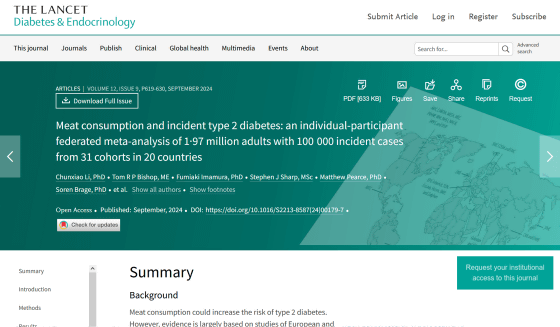Study finds that eating two slices of ham a day increases risk of type 2 diabetes by about 15%

Global meat production has increased sharply in the past few decades, but it has been pointed out that increased meat intake increases the risk of type 2 diabetes. A new study analyzing data from approximately 2 million people living around the world suggests that eating processed meats such as ham and red meat may increase the risk of type 2 diabetes.
Meat consumption and incident type 2 diabetes: an individual-participant federated meta-analysis of 1·97 million adults with 100 000 incident cases from 31 cohorts in 20 countries - The Lancet Diabetes & Endocrinology

Red and processed meat consumption associated with higher type 2 diabetes risk | University of Cambridge
https://www.cam.ac.uk/research/news/red-and-processed-meat-consumption-associated-with-higher-type-2-diabetes-risk
Two slices of ham a day can raise type 2 diabetes risk by 15%, research suggests | Diabetes | The Guardian
https://www.theguardian.com/society/article/2024/aug/20/two-slices-of-ham-a-day-can-raise-type-2-diabetes-risk-by-15-research-suggests
Type 2 diabetes is a disease that can cause serious consequences such as blindness, kidney failure, heart attacks, strokes, and amputations of the lower limbs, and is said to affect more than 400 million people worldwide. Ways to reduce the risk of type 2 diabetes include maintaining a healthy weight, exercising moderately, and improving your diet.
Previous studies have reported that people with high intakes of processed meat and unprocessed red meat have a higher risk of type 2 diabetes, but the results have been mixed. And while poultry meat, such as chicken and duck, is often seen as an alternative to red meat, there have been few studies examining the association between poultry meat consumption and the risk of type 2 diabetes.
A team led by researchers from the University of Cambridge analysed data collected from 31 studies conducted in 20 countries around the world through the EU-funded InterConnect project on type 2 diabetes and obesity, which included 1.97 million adults from Europe and North America, as well as South America, the Middle East, Southeast Asia and the Western Pacific.

The study significantly expanded the evidence base by using an approach that analyzed data from individual subjects rather than pooling the results of individual studies. In fact, 18 of the 31 studies used in the analysis did not publish findings on the association between meat consumption and the risk of type 2 diabetes.
After taking into account factors such as age, sex, health-related behaviors, energy intake, and body mass index (BMI), the study found that those who consumed 50g of processed meat per day (the equivalent of two slices of ham) were at a 15% higher risk of developing type 2 diabetes over the next 10 years, while continuing to consume 100g of red meat per day was associated with a 10% higher risk of developing type 2 diabetes.
On the other hand, people who consumed 100g of poultry meat per day had an 8% higher risk of type 2 diabetes, although this association weakened when examined in different scenarios.
Co-author Professor

◆ Forum is currently open
A forum related to this article has been set up on the official GIGAZINE Discord server . Anyone can post freely, so please feel free to comment! If you do not have a Discord account, please refer to the account creation procedure article to create an account!
• Discord | 'How often do you eat ham?' | GIGAZINE
https://discord.com/channels/1037961069903216680/1277560242196189184
Related Posts:







